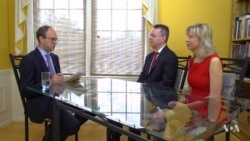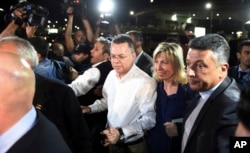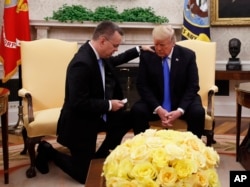A Turkish court on Oct. 12 freed American Pastor Andrew Brunson, who had been convicted on terror charges — charges he denies — and imprisoned for two years. Brunson, who is now back in the U.S. with his family, and his wife, Norine Brunson, spoke with Mehmet Toroglu of VOA’s Turkish service about his time in prison and how it felt to be released.
Q: How did you learn you were being released and how did you feel in that moment — whom would you want to thank?
Andrew Brunson: Well, I didn't know that I was going to be released because I was actually declared guilty. I knew that I was going to be declared guilty — it was very obvious from what was happening in the court — but I didn't know how many years they would get me as a sentence. Would it be five, 10, 15 or more? And when I was told I was found guilty — first of all, I was unhappy at being found guilty because I'm not guilty, but now officially, according to the court, [I was found] guilty of supporting terrorism, which is not at all what we're about.
We spent our time, 23 years in Turkey, working in churches and telling people about Jesus Christ, showing his love to people. So, we had nothing to do with any kind of terrorism. We never did anything against Turkey. In fact, we tried to bless Turkey and we often prayed for Turkey. So it was a surprise when we were accused of terrorism. So, when I was, I did not know how many years they would give me, I was very afraid that I would be sent back to prison, but when I heard that they were convicting me, giving me a three-year sentence and then releasing me because of time already served, two years that I've been held by the government, then I was very relieved. My wife and I got together, we knelt down on the courtroom floor, and we just prayed together and thanked God that this nightmare, this two-year-long nightmare, was finally coming to an end.
Norine Brunson: So, who do we thank? First, we thank God because he's the one that did it. And he did it through the prayers of people in Turkey, in America, in China, in Senegal, in Madagascar — I mean, all over the place. It was very supernatural. And this was all the Christians from all kinds of different churches that for some reason this was in their heart to pray for us. Very supernatural. And it was through these prayers that this happened.
Andrew Brunson: We believe God did it. But God uses people and he also used people in setting us free.
Q: Why do you think you were arrested?
Andrew Brunson: My wife has used the word “the perfect storm,” and what happened is that there had been an attempted coup, and of course that created a lot of tension in Turkey and the government was very, obviously, under tremendous pressure.
And at the same time, we had been working with Syrian refugees. There was a humanitarian crisis, but many of the ones that came to Izmir and that we ended [up] helping are Kurds, and that made the government uncomfortable because they are concerned about Kurdish terrorism through the PKK. And so they were suspicious of that.
Also, we are Americans and Christians, and Christians are often seen with some suspicion. And all of that happened at the same time, all of those factors coming together at the same time. We were actually arrested to be deported. When they arrested us, we were told that it was a threat to national security, and normally when that happens — it has happened to other friends of mine — then they are very quickly deported within a day or two.
But at our arrest someone wrote on our paper, they wrote “terrorism” — and then we knew that this was different. We feared that it would become much more serious, as it did, indeed, and it continued on for two years.
Q: Would you tell us about the circumstances in the prison? Were you treated well?
Andrew Brunson: I was treated well by prisoners and I did not complain about the conditions, whether it was cold or crowded or about food or anything like that. Although, some of those [conditions] were difficult. My main complaint was that I'm imprisoned — that my liberty has been taken away and I'm an innocent man.
As for the people I was with, for example I was in a very crowded cell at Sakran Prison for a number of months. Most of them were very nice to me, and prisoners supported each other. Everyone was of course very afraid. Most people had not been indicted. It was taking a year or longer.
It took 18 months for me to actually find out what I was being accused of. And during that time of course there was a lot of fear. Why am I in here? How long will I be in here? What am I going to be charged with?
They were all very conservative Muslims, committed Muslims. And obviously I'm a pastor, so I felt very alone in my faith. There wasn't anyone else there to pray with me, to support me, to correct me when I'm having wrong thoughts. But even so, there were several of the Muslim prisoners who were very kind to me and encouraged me during very difficult times.
Q: What did you know about the coup attempt?
Andrew Brunson: We knew nothing about it until it happened. I had been at a prayer meeting on Friday night and that had gone on for two or three hours. Then I returned to my home and turned on the television, and we saw on the news channels that something unusual was happening. So that's the first time I heard of it.
Now, I've been accused of helping to plan it, but we knew nothing about it. Shortly after that, I went to the States to visit my children — they were all studying in the States at that time — but then within three or four weeks after the coup, my wife and I returned to Turkey together. So while many people were trying to escape Turkey, because many people were being arrested at that time, we came back very confidently to Turkey because we were innocent and we had no idea that we would be charged with being involved in the coup.
Norine Brunson: We had nothing to do with it. So, August 12, we come back very comfortably to Turkey. This is our home. This is where we have our church. These are people we love, and we had no concern whatsoever.
Andrew Brunson: Yes.
Q: Well, let's assume you have a chance to sit down with Turkish President Recep Tayyip Erdoğan. What would you tell him?
Norine Brunson: We would welcome the opportunity, just like we were able to meet President [Donald] Trump. It was a huge honor, and to be able to pray for him there, and we would really love the opportunity to do that for any president. For any high position in authority. They need prayer. They all need prayer.
Andrew Brunson: So I would love to meet with him, and I would say to him that God loves him and wants to use him to bless the Turkish people. Leaders need prayer, and as Christians we are told to pray for our leaders. Whatever party they are from, we are told to pray for them. So I would love to meet with him and be able to pray for him in the same way I prayed for President Trump. Just to bless him in the name of Jesus Christ.
Q: What do you know about other Americans still in jail in Turkey right now, and why do you think you were the only one who was released?
Andrew Brunson: Well, the main difference between my case and theirs was that I'm an American citizen but they are dual citizens. They're American and Turkish, and they come from a Turkish background. The American government looks at us all the same. I was told this many times by consular visits. They would tell me, “We look at you all this same.” But the Turkish government looks at dual citizens, a citizen who's also a citizen of Turkey, [and] they'll say, “You're a Turk, so the United States should not be intervening or interfering in any way in this case, because you're a Turkish citizen.”
So I think that's the main issue. It's not an issue that the United States government gave more importance to me. We were at the State Department yesterday and Secretary of State [Mike] Pompeo said very clearly … that they still continue to work to get the other Americans released. So from the U.S. government side, they're committed to continue to work on this. The main issue has been that [the other prisoners] are also Turkish citizens, and so the Turkish government evaluates them differently.
Norine Brunson: This is what we think. This is what we think.
Q: Is there anything you'd like to add?
Norine Brunson: No. I mean, we pray for them too, for their spouses. It's a very difficult situation.
Andrew Brunson: I would like to say — we've said in a number of interviews — that we love Turkey, and this is true. We love the Turkish people, but we want to clarify what this means.
Obviously, we love Turkish food. We lived in Turkey for many years, and we love many things about the culture. But when we say we love Turkey and the Turkish people, what we especially mean by that is that God loves the Turkish people, and he gave us some of his love that he has for the Turkish people and put it in our hearts.
So it's not just that we're enamored of Turkish culture, although we love and have lived in it. We're talking about a different kind of love — the love of God that is in our hearts for the Turkish people. So we say we love Turkey in spite of what we've been through, and it was a very difficult two years for our family. We can say God loves Turkey and we love Turkey.







